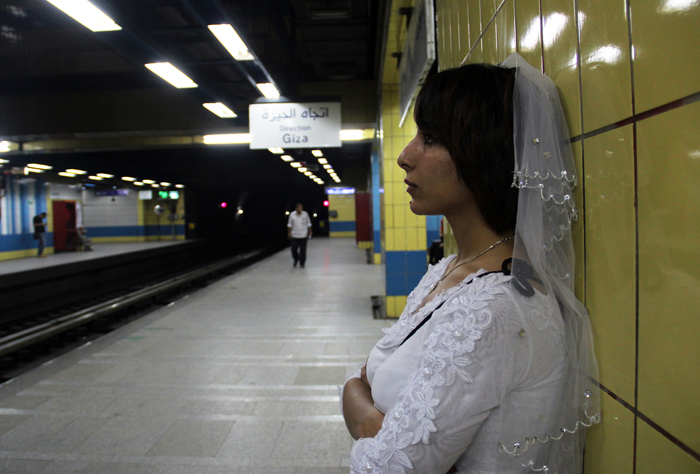Egypt’s other revolution is social
By Khaled Diab
Revolutionary disappointment in Egypt has concealed the ongoing social revolution whose shifting sands are likely to result in a political earthquake.

Wednesday 28 January 2015
The fourth anniversary of the Egyptian revolution “brings back memories of what might have been,” a relative of mine remarked.
And for those who were there, on Tahrir Square and in pretty much every town and village across the country, those memories are precious and magical. “I'm proud. We did good, we did right,” said a friend who was active in the 2011 uprising. “True, we lost [and] the villains are back in power… but we were right, and we tried.”
At the time, Egyptians discovered their latent and long-dormant power to rock the president's throne and unseat the pharaoh – all in just 18 days. In addition to elation and euphoria, this led to a sense of near-invincibility, that the revolution could surmount any obstacle and transform Egypt into a vibrant, free and equitable society.
In light of the brutal and deadly efficiency of the counterrevolution, four years on, even the most optimistic are disillusioned and disenchanted, with people I know calling it the “cruelest joke”. Some even wonder whether the revolution was just a mirage, an illusionary oasis for the thirsty millions stumbling through Egypt's dry desert of oppression.
But the political revolution was real, though it has been derailed and delayed, and I am convinced it is not over, not by a long shot, but it, like its French predecessor and others, will be a multi-generational project.
This is because, despite popular belief, the issues are not just political – they are social, economic and cultural too. Ever since the start of the revolution, I have warned that we must curb our enthusiasm because the uprising would not succeed without an accompanying social revolution, without the unseating of Egypt's million “mini-Mubaraks” stifling society and without addressing the country's centuries-old leadership vacuum.
And even at a time when the political revolution is fatally wounded, the social revolution, largely unnoticed and unappreciated, is, at many levels, in full swing. One area where revolutionary socio-economic change is visible is the organised labour movement.
The uprising of Egyptian workers actually predated the revolt in 2011 by a few years. In addition, Egypt's independent unions, despite the attention lavished on middle-class youth activists, played a pivotal role in the revolution, organising thousands of strikes and mobilising workers.
Moreover, the al-Sisi regime's efforts to contain and break the labour movement, and to co-opt some union leaders, have not succeeded. In 2014, despite the controversial anti-protest law, understated official figures show that Egypt witnessed 287 strikes, with independent estimates suggesting that the country was shaken by 2,274 incidents of industrial action. And continued failure to tackle this economic bottom line could well prove to be the current regime's undoing.
Beyond Egypt's workers, another long-marginalised group, which constitutes half of society, has also been up in arms. Tired of generations of having their rights deferred in the service of this or that greater cause, women are actively and muscularly agitating for change, both collectively and individually.
In a phenomenon I call Egypt's “underground sisterhood”, women are fighting Egypt's sexual harassment epidemic, including support networks, challenging the social stigma associated with being single, and even struggling to become mosque preachers, not to mention the growing number of “feminist” men, even from traditional backgrounds.
In addition to the huge ranks of women involved in every line of activism, this is reflected in the rising number of women rejecting the hijab or headscarfed women choosing lifestyles previously associated with their “liberal” sisters, as well as those who break away from convention by living alone. Then there are the women intruding on traditional male domains, such as the traditional men-only tea houses, and even the iconic photograph of a public kiss between a girl in a hijab and her boyfriend.
Despite the risks involved, even previously unrecognised minorities, such as atheists, are beginning to demand attention and rights.
While the social ground shifts and quakes, political activists are digging in for the long haul and trying to learn from their mistakes. “That's our homework: to prepare a substitute,” Mohamed Nabil, a leader in the now-banned 6 April Youth Movement, was quoted as saying. “At the end al-Sisi is lying, and the Egyptian people will react. You never know when.”
In fact, I sense that al-Sisi may find himself unwittingly presiding over Egypt's transition to democracy. This is not because the Egyptian president is ready for democracy – none of them have been – but Egypt will be.
With the social ground rumbling beneath his feet and oppositions forces regrouping despite the repression, al-Sisi will eventually find himself faced with a stark choice: reform or perish. Given the weakness of the state and the fact that the repression machine is already working at full throttle, pragmatism and self-preservation would require al-Sisi to recognise Egypt's pluralism and make major concessions.
Failure to reform could, at best, spark a third revolutionary wave or, at worst, push Egypt off the cliff into the abyss of full-out civil conflict. Today, as in 2011, the answer to Egypt's woes remains freedom, democracy, and socio-economic justice.
____
Follow Khaled Diab on Twitter.
This article first appeared on Al Jazeera on 24 January 2015.


Pingback: The resurfacing power of Arab women | Live News Pakistan